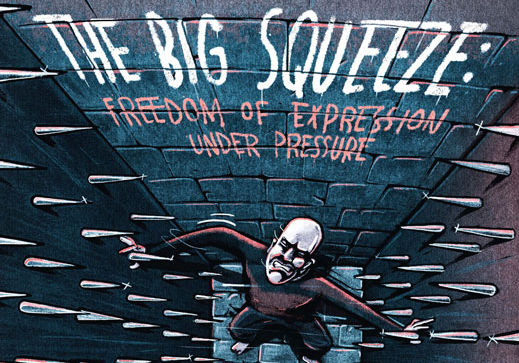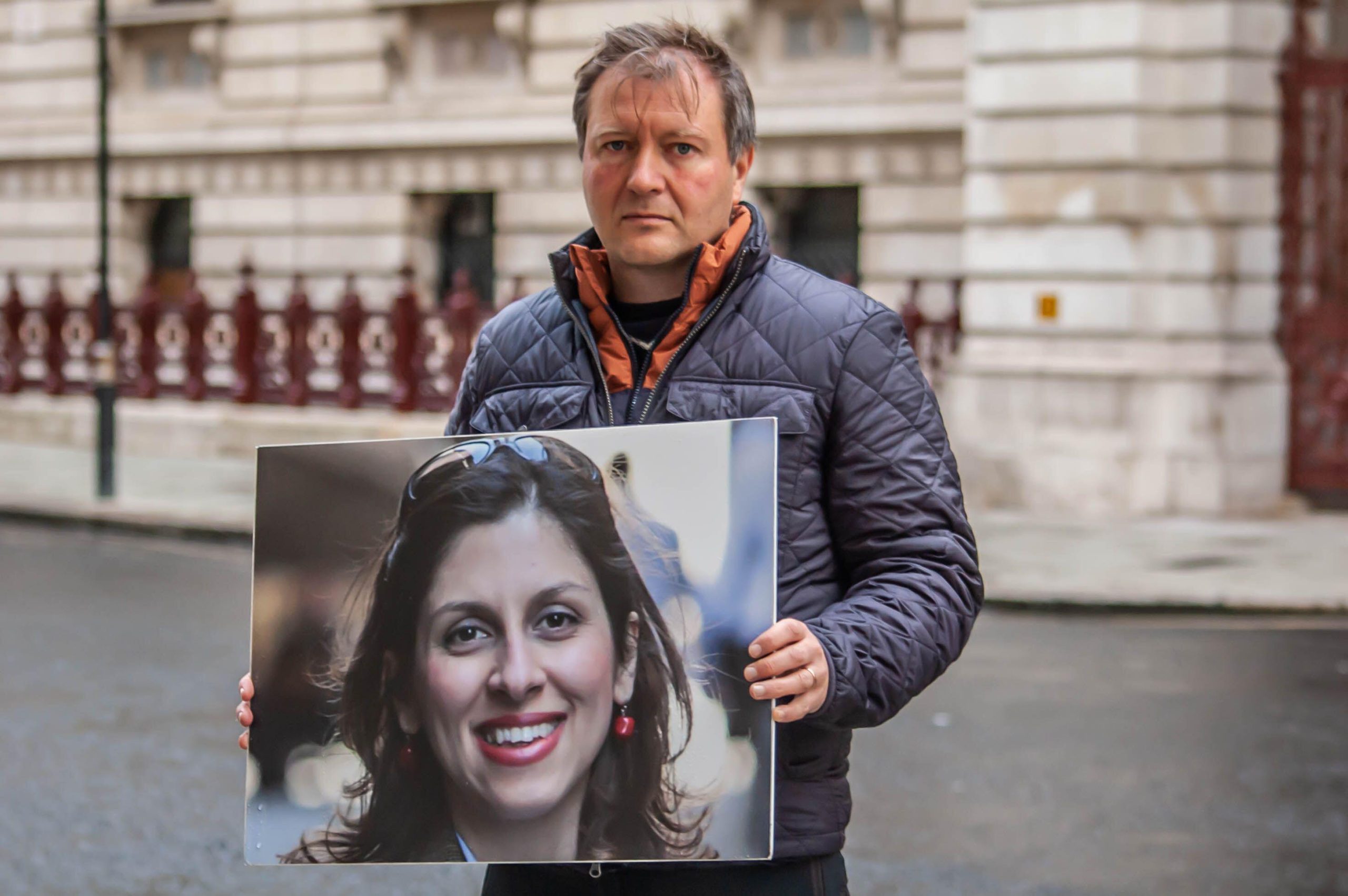[vc_row full_width=”stretch_row” full_height=”yes” css=”.vc_custom_1491319101960{background-image: url(https://www.indexoncensorship.org/wp-content/uploads/2017/04/Cover-slider.jpg?id=88947) !important;background-position: center !important;background-repeat: no-repeat !important;background-size: contain !important;}”][vc_column][/vc_column][/vc_row][vc_row][vc_column][vc_custom_heading text=”The “now” generation’s thirst for instant news is squeezing out good journalism.
We need an attitude change to secure its survival” google_fonts=”font_family:Libre%20Baskerville%3Aregular%2Citalic%2C700|font_style:400%20italic%3A400%3Aitalic”][/vc_column][/vc_row][vc_row][vc_column][vc_column_text]
THIS WORLD HAS never been in more need of good, well-researched journalism. It is tempting to write the words “old-fashioned” here too. And if by old-fashioned, what is meant is detailed, neutral, in-depth and well thought-out writing, then old-fashioned is what is called for.
Around the world there are squeezes from all directions, stifling what the public is allowed to know, and what it is allowed to say or write. From government pressure to mafia threats, from commercial agencies to reputation- damaging (ro)bots, the right to speak and report is under huge pressure.
And good journalism must be there to unmask those threats. With the rise of the words “fake news” comes a spirit that seems to think that I can apply this phrase to anything I disagree with. So the epithet “fake news” was out of its box and being used to try to disarm reporters and to undermine public belief both in research, experts, truth and often journalism.
So, this is a time for journalists and journalism to step up and do a really excellent, thorough job of discovering and publishing the news: that’s not a news broadcast or publication that is just a hodgepodge of opinions based on very little research; nor a news story that has so much spin in it it’s hard to discern any actual facts. There are those that might argue that the media has been through a pretty unimpressive period in the past 10 years, with some valiant exceptions. The line between the news and opinion pages has become increasingly hard to distinguish. So, it might be less than surprising that the public might have lost faith in news sources.
Social media has played a massive part in this. Hysterical opinion goes down a storm, instantly shared across platforms; while well-argued journalism, with more facts than screeching, tends to stay in its box, unread. And, of course, there are signs that attention spans are melting away. So not only does every item have to be now, now, now, but we can only be bothered to read the first line, or look at the picture.
Sadly, research from Stanford University shows young people are gathering their “news” from social media without bothering even to click through on a link. They also have trouble discerning the difference between a social media-placed advertising feature and a news story from a well-established news media company. So shareable opinion has become king, and news has melted away and merged into a hybrid of what it once was.
But journalists need to take back the news wherever they can, and re-establish it as a well-researched, investigated piece of information, not an outpouring of ill-informed thoughts. And the public has to take some responsibility too. We need to be capable of a bit more dissection and scepticism when we see stories, rather than swallowing them whole without thinking.
[/vc_column_text][/vc_column][/vc_row][vc_row][vc_column width=”1/4″][vc_icon icon_fontawesome=”fa fa-quote-left” color=”custom” align=”right” custom_color=”#dd3333″][/vc_column][vc_column width=”3/4″][vc_custom_heading text=”Hysterical opinion goes down a
storm, instantly shared across
platforms; while well-argued
journalism, with more facts
than screeching, tends to stay in
its box, unread” google_fonts=”font_family:Libre%20Baskerville%3Aregular%2Citalic%2C700|font_style:400%20italic%3A400%3Aitalic”][/vc_column][/vc_row][vc_row][vc_column][vc_column_text]
As our seasoned journalists explain in our Decoding the News special, everyone should be aware of techniques and tools to stop them being taken in, at least most of the time. Meanwhile, journalists are doing some really strong investigations.
As we go to press the BBC was broadcasting a story about truck drivers in the supply chain for furniture company Ikea, who were being paid less than the minimum wage, and being forced to live in their vehicles. They were drivers from Romania but working in Denmark, where they should have been paid according to Danish laws. The journalist was on the road talking to lorry drivers to find the story. Stories like these are hard to dispute, because the journalist has evidence to stand up the allegations.
Over in the Maldives, journalist Zaheena Rasheed, shortlisted for an Index journalism award this year (see page 37), is reporting about what is happening in the south Asian island country, despite a climate of fear. And in other countries, remarkable reporters continue to make extraordinary efforts to get news out, despite dangerous conditions.
There are some signs that the world is starting to realise it needs good journalism. The New York Times saw a growth of 41,000 subscriptions in the week immediately after the election of President Trump. Sales of satire and news magazine Private Eye recently hit their highest level ever with 287,334 copies sold for one issue. Reports from Poland suggest a surge in sales of independent weekly Tygodnik Powszechny (see our report on page 69). This in a country that is seeing its media freedom fall down global charts. Jeremy Leslie, creative director of magazine- only shop Magculture in London, said he is seeing an upward tick in the sales of magazines “with serious intent”.
“More people are making [magazines with that type of content] and more people are buying it,” he told Index on Censorship.
Is this a sign that some members of the public are learning at last that if they want journalism that tells them something they don’t know (and isn’t made up), they just might have to pay for it? Only time will tell. Otherwise, the survival of journalism looks fraught with danger.
[/vc_column_text][/vc_column][/vc_row][vc_row][vc_column][vc_column_text]
Rachael Jolley is the editor of Index on Censorship magazine. She recently won the editor of the year (special interest) at British Society of Magazine Editors’ 2016 awards
[/vc_column_text][/vc_column][/vc_row][vc_row][vc_column][vc_custom_heading text=”From the Archives”][vc_row_inner][vc_column_inner width=”1/3″][vc_single_image image=”80566″ img_size=”213×289″ alignment=”center” onclick=”custom_link” link=”http://journals.sagepub.com/doi/pdf/10.1177/0306422015605737″][vc_custom_heading text=”A matter of facts: fact-checking’s rise” font_container=”tag:p|font_size:24|text_align:left” link=”url:http%3A%2F%2Fjournals.sagepub.com%2Fdoi%2Fpdf%2F10.1177%2F0306422015605737|||”][vc_column_text]September 2015
Vicky Baker looks at the rise of fact-checking organisations being used to combat misinformation, from the UK to Argentina and South Africa.[/vc_column_text][/vc_column_inner][vc_column_inner width=”1/3″][vc_single_image image=”80569″ img_size=”213×289″ alignment=”center” onclick=”custom_link” link=”http://journals.sagepub.com/doi/pdf/10.1177/0306422016657017″][vc_custom_heading text=”Giving up on the graft and the grind” font_container=”tag:p|font_size:24|text_align:left” link=”url:http%3A%2F%2Fjournals.sagepub.com%2Fdoi%2Fpdf%2F10.1177%2F0306422016657017|||”][vc_column_text]June 2016
European journalist Jean-Paul Marthoz argues that journalists are failing to investigate the detailed, difficult stories, fearing for their careers.[/vc_column_text][/vc_column_inner][vc_column_inner width=”1/3″][vc_single_image image=”90839″ img_size=”213×289″ alignment=”center” onclick=”custom_link” link=”http://journals.sagepub.com/doi/pdf/10.1177/030642209702600315″][vc_custom_heading text=”In quest of journalism” font_container=”tag:p|font_size:24|text_align:left” link=”url:http%3A%2F%2Fjournals.sagepub.com%2Fdoi%2Fpdf%2F10.1177%2F030642209702600315|||”][vc_column_text]May 1997
Jay Rosen looks at public journalism, asserting that the journalist’s duty is to serve the community and not following professional codes.[/vc_column_text][/vc_column_inner][/vc_row_inner][vc_separator][/vc_column][/vc_row][vc_row][vc_column width=”1/3″][vc_custom_heading text=”The Big Squeeze” font_container=”tag:p|font_size:24|text_align:left” link=”url:https%3A%2F%2Fwww.indexoncensorship.org%2Fmagazine|||”][vc_column_text]The spring 2017 issue of Index on Censorship magazine looks at multi-directional squeezes on freedom of speech around the world.
Also in the issue: newly translated fiction from Karim Miské, columns from Spitting Image creator Roger Law and former UK attorney general Dominic Grieve, and a special focus on Poland.[/vc_column_text][/vc_column][vc_column width=”1/3″][vc_single_image image=”88788″ img_size=”medium” alignment=”center” onclick=”custom_link” link=”https://www.indexoncensorship.org/magazine”][/vc_column][vc_column width=”1/3″][vc_custom_heading text=”Subscribe” font_container=”tag:p|font_size:24|text_align:left” link=”url:https%3A%2F%2Fwww.indexoncensorship.org%2Fsubscribe%2F|||”][vc_column_text]In print, online. In your mailbox, on your iPad.
Subscription options from £18 or just £1.49 in the App Store for a digital issue.
Every subscriber helps support Index on Censorship’s projects around the world.
![]() SUBSCRIBE NOW[/vc_column_text][/vc_column][/vc_row]
SUBSCRIBE NOW[/vc_column_text][/vc_column][/vc_row]





